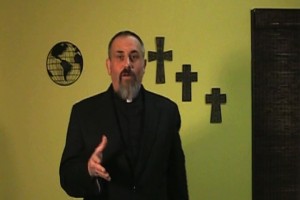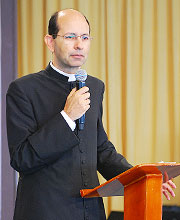In today’s gospel reading, we see the famous words of John 3:16: This is a powerful reminder of just how much God loves each and every one of us. However, we need to ask the question just what does that mean? Indeed, the common question that surrounds this is that if God loves me and even gave His Son for me, does that mean that He accepts me just as I am? Actually, No.
This can be quite confusing, because often we can believe that love and acceptance are the same or even that love and tolerance are the same. Indeed, they are virtually opposite.
First, let us look at God’s love. Our salvation and growth in holiness is initiated by God’s loving action to us, but it requires a response from us, just as every act of love calls for a response. God loves us, but calls us also to love Him and His people, that is our response. So His love is not unilateral, it is initiated into a relationship that grows infinitely. However, if I do not respond to His love then it does not grow.
His love is transforming and leads us to grow into the fullness of both humanity and life. If I choose not to be transformed then His love has no affect on me at best and can be destructive to me personally at worst. I will explain that in a minute.
So, He does not accept me as I am. He accepts me and calls me to be all He created me to be. That is a lifelong process that is a growth in holiness but it begins by turning from all those things that dehumanize me. We call those things sins and encumbrances to them.
So God truly loves me, He did send his Son, but then through his Son I receive the call to grow to be more like His Son. If I refuse that call, then I can accept or reject His love but either way I do not return it. If I persist in this, that process hardens my heart leaves me more and more resistant to the transforming power of God’s love. God tries to draw closer to me, but I resist and actually move farther from Him. This leads me away from the light and away from the source of all that is good into the cold darkness of self-centeredness and narcissm we call obstinancy of heart.
 We can see people in the bible who do this: The Pharisees, whom Jesus called children of the Devil; Judas, whom Jesus warned would be better off if he was never born; those who scandalize others whom Jesus warned would be better off with a millstone around their necks and cast into the sea. This does not sound like someone who accepts everyone just the way they are. Meanwhile, those greatest of sinners, who did not have this obstinancy of heart, but sought to receive all that Jesus had to offer including salvation go the opposite way. They grow in holiness and become separated from what they once where. Peter tells Jesus that He is too sinful to be his follower and Jesus ignores him and makes him the leader of the Apostles. Zecharias is considered one of the most corrupt men in the village but in encountering Jesus is transformed by him and becomes a new man. St. Paul a vicious, murderous pharisee, turns into an apostle and martyr for Christ. Each of these encountered Christ and were transformed by Him who does not accept them as they are.
We can see people in the bible who do this: The Pharisees, whom Jesus called children of the Devil; Judas, whom Jesus warned would be better off if he was never born; those who scandalize others whom Jesus warned would be better off with a millstone around their necks and cast into the sea. This does not sound like someone who accepts everyone just the way they are. Meanwhile, those greatest of sinners, who did not have this obstinancy of heart, but sought to receive all that Jesus had to offer including salvation go the opposite way. They grow in holiness and become separated from what they once where. Peter tells Jesus that He is too sinful to be his follower and Jesus ignores him and makes him the leader of the Apostles. Zecharias is considered one of the most corrupt men in the village but in encountering Jesus is transformed by him and becomes a new man. St. Paul a vicious, murderous pharisee, turns into an apostle and martyr for Christ. Each of these encountered Christ and were transformed by Him who does not accept them as they are.
 There is another element to this as well, and this is not really understood in many US Catholic circles. The image that some US Catholics have of God is the opposite of the “Jesus accepts me as I am” group. This group sees God as the Wizard of OZ phantom who screams silence to Dorothy and her friends looking for good things. So people stand before God who is ready to cast them into Hell for the slightest infraction. That is hardly the Catholic concept of God, but does match more Jonathan Edwards infamous 18th Century New England sermon: Sinners in the Hand of an Angry God.
There is another element to this as well, and this is not really understood in many US Catholic circles. The image that some US Catholics have of God is the opposite of the “Jesus accepts me as I am” group. This group sees God as the Wizard of OZ phantom who screams silence to Dorothy and her friends looking for good things. So people stand before God who is ready to cast them into Hell for the slightest infraction. That is hardly the Catholic concept of God, but does match more Jonathan Edwards infamous 18th Century New England sermon: Sinners in the Hand of an Angry God.
Fr. Paulo Ricardo is a former rector of the seminary in Cuitaba Brazil, now the judicial vicar for that diocese and is part of the Vatican’s International Council for Catechesis. I describe him as the Brazilian Archbishop Fulton Sheen, unfortunately for us English speakers, he preaches in Portuguese. He makes an interesting comment in his words on Purgatory. He says tells the story of drawn from catechesis by Pope Benedict XVI of St. Catherine of Genoa who had an experience of Purgatory while she was still in the flesh. She found that God’s all consuming love had become like flames of fire when it encountered her many impurities.This is like the many passages of the bible that call our difficulties to be like the fire that purifies gold. She understood that Purgatory was a time of purification that when completed allowed one to be in the presence of this pure love. Without it, it would be a painful horrible experience. We cannot stand in obstinancy of heart within the all consuming love of God.
So Jesus calls us to allow ourselves to be transformed by His grace in preparation for our time in union with God.
Now imagine Jesus accepting us as we are, with absolutely no call to repentance and to holiness knowing that if we stand in obstinacy with a hardened heart in the presence of the all consuming love of God that St. Catherine understood to be like flames, we would experience misery beyond our imagination just because we were in His presence and unwilling to change. How could we possibly call Jesus loving when He just enabled us to a hardened heart that would be at best consumed and worst permanently in the presence of this all consuming love. He would be like the false prophets of the Old Testament that cry out Peace and Security.
This is why Jesus does not accept us as we are. He comes to heal our sinfulness and our obstinacy. He comes first to heal the worst of all sinners and He comes to bring all to salvation, but He can do nothing for those who will seek Him on their own terms and will be in His presence if and only if He accepts them as they are for all eternity. Jesus came to call repentant sinners and for them He died on the cross. To those who choose not to repent, He also died on the cross but His act cannot bear fruit in them because they cannot accept His gift as it requires them to change and they choose not to do so.
If you are going to be part of the all consuming love of the Holy Trinity on this Sunday then be docile to the grace that comes to us from the Father, Son and Holy Spirit through the mediatrix of grace Our Heavenly Mother. Allow yourself to be transformed in that grace throughout your life and prepare joyfully for the day you stand purified in the presence of that same Holy Trinity.
God Bless You,
Fr. Robert J Carr
Fr. Carr is an alliance member of the New Song Community (Canção Nova). He is the pastor of St. Benedict Parish in Somerville, MA and is the editor of this blog. You may also find his videos in English at Gloria.tv. He also has a regular radio program on WebRadio Canção Nova. Which he podcasts on the Canção Nova podcast website and here on Catholicismanew.
You can follow him on twitter as @frbobcarr



